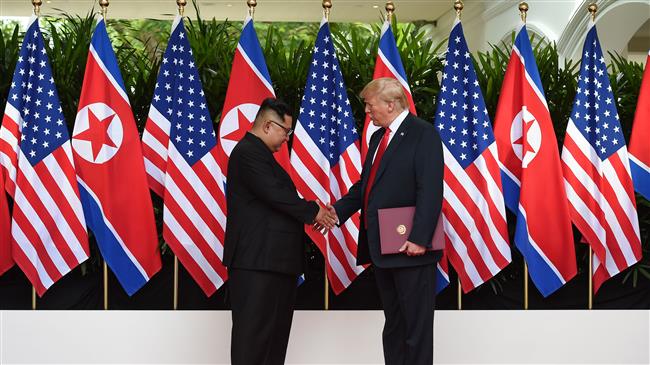US seeks full list of North Korean weapons programs
A top US diplomat has called on North Korea to fully disclose its weapons program amid lack of progress over denuclearization talks.
“Before the process of denuclearization can be final, we must have a complete understanding of the full extent of the North Korean WMD and missile programs through a comprehensive declaration,” US special representative on North Korea Stephen Biegun said.
“We must reach agreement on expert access and monitoring mechanisms of key sites to international standards, and ultimately ensure the removal or destruction of stockpiles of fissile material, weapons, missiles, launchers and other weapons of mass destruction,” added Biegun.
“We say we will not lift sanctions until denuclearization is complete. That is correct. We didn't say we won't do anything until you do everything,” he said.
The US negotiator also said on Thursday that Trump was willing to offer diplomatic relations and financial aid to the country.
North Korean Leader Kim Jong Un and the US President Donald Trump met in Singapore in June, reaching a vague denuclearization agreement. The ensuing talks between the two sides have had little progress since then.
Trump hailed “tremendous progress” in his dealings with the North Korea and said on Thursday that the date and location of a second summit with Kim would be announced.
North Korea has complained that the US has done little to reciprocate for its actions so far to dismantle some weapons facilities and freeze its weapons testing.
Pyongyang has denounced what it called US "gangster-like behavior", saying Washington has betrayed the spirit of the June summit by making unilateral demands on the complete, verifiable and irreversible denuclearization, while keeping the sanctions in place.

Many analysts cast a shadow of doubt on the functionality of the Singapore meeting, arguing that Trump was merely after a legacy of his own by sharing the stage with the leader of the isolated country to reach a deal.
Rejecting criticism that the Singapore declaration was dysfunctional, Biegun claimed that Kim had committed to "the dismantlement and destruction" of all plutonium and uranium sites, not only its signature Yongbyon facility.
Trump said earlier that there was "a decent chance" of North Korea quitting its nuclear weapons program.
Director of US National Intelligence Dan Coats, however, maintained a different tone. "North Korea is unlikely to give up all of its nuclear weapons and production capabilities," said Dan Coats to the Senate intelligence committee on Thursday.
Biegun also claimed that Trump wished to de-escalate the state of war after the US leader threatened to "totally destroy" the country in the United Nations Assembly in 2017.
"We are not going to invade North Korea. We are not seeking to topple the regime," Biegun said.
The official, however, said the US did not intend to withdraw its 28,500 troops from South Korea. The US military presence in the South and the joint war-games with Seoul has long been a stumbling block to peace on the Korean peninsula.
"We are not involved in any diplomatic discussion -- full stop -- that would suggest this trade-off. It has never been discussed," Biegun said.
The State Department announced Biegun would fly to South Korea on Sunday to meet his North Korean counterpart.
Occupation of Syria’s highest peak Mount Hermon part of ‘Greater Israel’ project
Iran: Syrian people will decide their future without foreign interference
IRGC says Iran’s power exceeds borders, warns enemies to adjust themselves
Dozens detained, several wounded in Israeli raids in West Bank
‘Ethnic cleansing’: Hamas blasts Israeli attacks on Gaza hospital amid intl. silence
Saudi delegation meets HTS leader at presidential palace in Damascus
Relentless Israeli ceasefire violations justify need for self-defense: Lebanese MP
Tel Aviv tells Damascus Israeli forces will remain in occupied territory: Report











 This makes it easy to access the Press TV website
This makes it easy to access the Press TV website